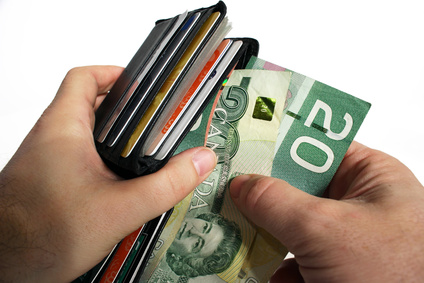You’ve just made the biggest purchase of your life. After waiting months to close on your home, suddenly you’ve found yourself short $4,000.
All too often, unnoticed costs catch new homebuyers by surprise. That’s despite lenders commonly requiring “proof” that you can cover your closing costs.
A TD home buyers survey found that 13% of first-time buyers “overlooked some of the one-time fees associated with buying a home.” Common examples include inspection fees, utility fees and land transfer costs. (If we’re talking all closing fees, that number’s probably much greater than 13%.)
A full 60% said the biggest lesson they learned from their home buyer experience was “to be more thorough when budgeting and accounting for all of the costs of home ownership.”
The “hidden” wallet drainers
Most homebuying costs aren’t hidden at all, at least not for those who do their research beforehand.
According to TD, the three outlays buyers are most unprepared for are:
- land transfer taxes (48%)
- general closing expenses (47%)
- legal fees (47%)
The following is a list of costs folks incur during the home-buying process. It comes, in part, from this handy checklist from CMHC.
Home purchase costs
- Purchase price (might as well state the obvious)
- GST/HST/QST (applies to new construction; a GST rebate may be available)
Main upfront costs
- Down payment (here’s a calculator to find your minimum down payment)
- Appraisal fee ($200-$500+ if applicable; many lenders or brokers rebate you for it; doesn’t apply to most insured mortgages)
- Status certificate / estoppel certificate fee (for condo/strata properties – typically less than $200; not applicable in all provinces—e.g., Quebec)
- Development fees (these apply to new developments and include things like grading deposits and tree planting fees)
- Home inspection fee ($300-$500)
- Land registration fee
- Legal fees and disbursements (somewhere around $1,200-$1,700 on a purchase transaction)
- Mortgage broker’s fee (typically only applies to non-prime mortgages; 1-2%+ of the mortgage)
- Mortgage loan insurance premiums (for those putting down less than 20%)
- Here’s a calculator to determine the cost
- They can be rolled into your mortgage
- Note: For buyers in Manitoba (7%), Ontario (8%), Quebec (9.975%) or Saskatchewan (6%), provincial tax is charged on your mortgage insurance. Unlike the insurance premium itself, the tax cannot be included in the mortgage and must be paid out of pocket
- For example, if you put down 10% on a $300,000 purchase in Ontario, your insurance would be $8,370. The provincial tax would be $669.60
- Prepaid property taxes and utilities (varies)
- Property insurance (depends on the home value, but typically $100-150 +/- per month)
- Survey or certificate of location fee (if applicable)
- Title insurance ($250-$300+)
- Water or septic tests (if applicable)
Land Transfer Taxes
This is probably one of the largest upfront expenses for homebuyers. It’s charged in most jurisdictions across Canada whenever a property is transferred to another owner. In Quebec, it’s tauntingly called the “taxe de Bienvenue,” or welcome tax.
In most cases the tax is tiered. For example, in Manitoba you pay 0% on the first $30,000, 0.5% on the next $60,000, 1.0% on the next $60,000, 1.5% on the subsequent $50,000 and 2.0% on the remaining value in excess of $200,000.
To take the guesswork out of how big a hit you can expect from the taxman, there are handy calculators available to tally your total depending on your province.
First-time buyers take note, provinces and some municipalities offer rebates that can greatly reduce the amount of land transfer tax you owe. Additionally, an income tax credit is available for qualifying first-time homebuyers in Canada, which can be worth up to $750 in tax relief.
The Costs Keep Coming
Property expenses don’t end on closing day. Owning your own castle comes with lots of ongoing costs—costs that put a minority of budget-challenged homebuyers in a whole heap of debt:
- Appliances
- Cleaning costs
- Initial condo fees and deposits
- Decorating materials
- Air conditioning & dehumidifier
- Gardening tools
- Hand and power tools
- Moving expenses
- Renovations or repairs
- Service and utility hookup fees (phone, internet, etc.)
- Snow clearing equipment or service
- Window treatments or coverings
How to prepare for closing costs
- Put them in a spreadsheet and budget for them.
- Most financial institutions recommend setting aside roughly 1.5% of your purchase price to cover closing costs (e.g., $6,000 on a $400,000 purchase). But it can be far more depending on what/where you’re buying.
- The total depends greatly on where you live, the type of home you’re buying and whether the home is resale or a new construction.
- Be kind to your credit card.
- Don’t overload your plastic with closing and decorating expenses. Digging a debt hole for yourself is the fastest way to feel house poor.
- Remember that your mortgage approval is contingent on you not increasing your debt load before closing. We’ve seen many a case where eager-to-be homeowners have racked up home improvement expenses, exceeded the lender’s allowable debt ratios and jeopardized their closing. (Yes, lenders do sometimes re-check your credit before closing.)
- Budget more than expected.
- Any additional funds can always be put towards paying down your mortgage quicker.

 log in
log in
 You’ve just made the biggest purchase of your life. After waiting months to close on your home, suddenly you’ve found yourself short $4,000.
You’ve just made the biggest purchase of your life. After waiting months to close on your home, suddenly you’ve found yourself short $4,000. Land Transfer Taxes
Land Transfer Taxes
5 Comments
Great summary of some of the many costs that can catch a new homeowner off guard. When I purchased my first home 8 years ago I remember the tax on the mortgage insurance as being the biggest surprise for me (not that it was a huge amount, but when you’re in the process of buying a home, ANY surprise cost can throw off your budget). Best advice is to overestimate how much you will need at closing time. Like the article states, there are no shortages of where you can use any leftover money – putting it towards the mortgage being a pretty good option.
So true Jeremy.
Closing costs seemingly come out of nowhere if you’re a new buyer. Way back when, I remember banging my head against the wall after learning we had to pay our developer $1,000 on closing, to install two dinky trees near our curb. It was a new subdivision so tree planting fees are common, but it was our first new-build so what did I know?!
A good reminder for today’s new homeowners who are likely finding themselves financially squeezed after closing on their new $800k+ home. I remember some of these costs catching me by surprise 20+ years ago and my home, in relative terms, was a fraction of the price.
Lots of fees here are not really fees. Home insurance is a monthly cost (like utilities). Prepaid property taxes and utilities applies is the amount that seller paid, but are not going to live there. Home inspection is a huge waste of money and I am not going to bother with it on the next house. Lawyer is about $1000 – this is also a waste of money, but unfortunately you can’t go around it (in their dispensing fees they charge you something like $40! for photocopying). Title insurance is around $500. Mortgage loan insurance is again monthly cost. No one should be paying mortgage broker for anything (they get paid more than enough on signup of new clients): appraisal fee, mortgage broker fees. Land registration fee should be included with lawyer’s fee. Actually my lawyer fee was all of these plus the title insurance – around 1,500.
It’s kind of silly to debate whether everything is a fee or not. Whether you call something a fee or premium or something else, it is a cost of home ownership and too many young people dismiss these costs.
Home insurance is not just monthly. It can be paid annually. Call it whatever you want. If you don’t pay it, you don’t get a mortgage.
As for “No one should be paying mortgage broker for anything (they get paid more than enough on signup of new clients)”. You are wrong when it comes to non-prime mortgages. Oftentimes, brokers aren’t paid anything by the lender for all the work they do to arrange a non-prime mortgage. Or they are paid relatively little.